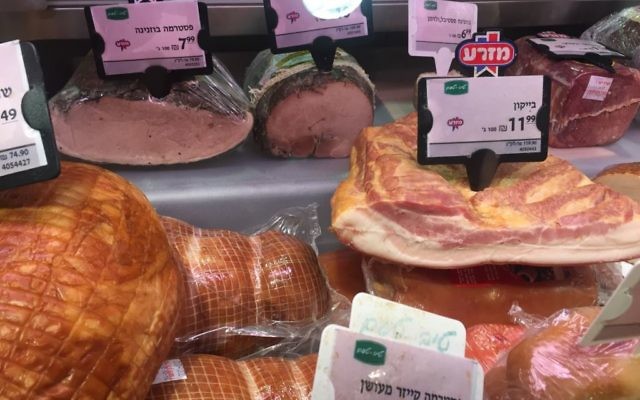Pork in Israel Reflects Clash of Cultures
"White meat" is part of the struggle to apply Jewish tradition to modern practices in a Jewish state.

An upscale Tel Aviv restaurant was sued recently over allegations that it served its customers pork when they thought they were ordering veal.
Despite a lack of physical evidence, with the restaurant staunchly denying the allegation, the ruling in the class action lawsuit went against the restaurant’s owners. Their punishment: serving free food worth 2.4 million shekels (roughly $700,000) to the restaurants’ customers.
The lawsuit received wide press coverage. The judgment fits into a greater question in Israel surrounding the raising of pigs and the availability of pork products.
Despite Judaism’s prohibition on eating pork, pigs are raised, slaughtered and processed as food in Israel. Pork, referred to as “white meat” in Hebrew, has been available at numerous restaurants and stores in Israel for decades.
Should violations of kosher laws be punishable in Israel? What about eating a cheeseburger? Or drinking milk with a meat meal? The controversy has a history.
In 1961, Prime Minister David Ben-Gurion successfully advocated for a law forbidding pig farming in Israel. Shortly after, though, under pressure from France, Israel’s main supplier of military technology at the time, the Knesset amended the bill to allow pork to be raised and consumed in Christian areas of the country.
Changing the law received pushback. Many Jews in Israel were outraged that the Knesset sanctioned blasphemous practice.
While it remained a domestic issue from the 1960s forward, it was not a priority for many.
Kibbutz Mizra, near the Christian Arab city of Nazareth, raised pigs and processed pork products for domestic sale beginning in 1957. Likewise, pork steak served in pita with tahini sauce was a popular dish in Tel Aviv at the time.
Pork steak was an affordable substitute for beef products that either were expensive or not easily accessible.
With pork consumed largely in the Tel Aviv area, a predominantly Jewish but secular city, and in Christian Arab areas, the issue remained a quiet one. In the 1990s, as nearly 1 million Russian immigrants came to Israel, the debate over pork’s place in Israeli society resurfaced.
Many of the immigrants came to Israel with a cultural framework that stood in contrast to much of Israeli society. Despite their Jewish roots, many of the new immigrants consumed pork regularly in the secularized Soviet Union. They wished pork to be a continued eating option.
In 2004, addressing the growing outrage of many citizens about the increasing presence of pork, the Israeli Supreme Court made a ruling. To the dismay of many, it said “white meat” could be had.
Pork remains widely available in many parts of Israel. This is unlikely to change. Two conclusions: The diversity of religious, cultural and culinary traditions remains ever so present in Israel, and Israel is still defining the applicability of traditional Jewish law to modern practices.
Eli Sperling is the Israel specialist and assistant program coordinator for the Center for Israel Education (www.israeled.org).



comments